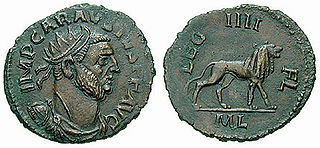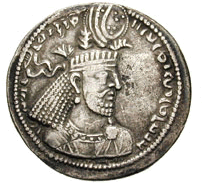
Year 286 (CCLXXXVI) was a common year starting on Friday of the Julian calendar. At the time, it was known as the Year of the Consulship of Maximus and Aquilinus. The denomination 286 for this year has been used since the early medieval period, when the Anno Domini calendar era became the prevalent method in Europe for naming years.
The 270s decade ran from January 1, 270, to December 31, 279.
Year 305 (CCCV) was a common year starting on Monday of the Julian calendar. At the time, it was known as the Year of the Consulship of Constantius and Valerius. The denomination 305 for this year has been used since the early medieval period, when the Anno Domini calendar era became the prevalent method in Europe for naming years.
The 290s decade ran from January 1, 290, to December 31, 299.
The 280's decade ran from January 1, 280, to December 31, 289.

Year 295 (CCXCV) was a common year starting on Tuesday of the Julian calendar, the 295th Year of the Common Era (CE) and Anno Domini (AD) designations, the 295th year of the 1st millennium, the 95th year and last 6 years of the 3rd century, and the 6th year of the 290s decade. At the time, it was known as the Year of the Consulship of Tuscus and Anullinus. The denomination 295 for this year has been used since the early medieval period, when the Anno Domini calendar era became the prevalent method in Europe for naming years.
Year 294 (CCXCIV) was a common year starting on Monday of the Julian calendar. At the time, it was known as the Year of the Consulship of Constantius and(Galerius) Maximianus. The denomination 294 for this year has been used since the early medieval period, when the Anno Domini calendar era became the prevalent method in Europe for naming years.

Year 293 (CCXCIII) was a common year starting on Sunday of the Julian calendar. In the Roman Empire, it was known as the Year of the Consulship of Diocletian and Maximian. The denomination 293 for this year has been used since the early medieval period, when the Anno Domini calendar era became the prevalent method in Europe for naming years.
Year 174 (CLXXIV) was a common year starting on Friday of the Julian calendar. At the time, it was known as the Year of the Consulship of Gallus and Flaccus. The denomination 174 for this year has been used since the early medieval period, when the Anno Domini calendar era became the prevalent method in Europe for naming years.

Year 307 (CCCVII) was a common year starting on Wednesday of the Julian calendar. At the time, it was known as the Year of the Consulship of Severus and Maximinus. The denomination 307 for this year has been used since the early medieval period, when the Anno Domini calendar era became the prevalent method in Europe for naming years.

Year 338 (CCCXXXVIII) was a common year starting on Sunday of the Julian calendar. At the time, it was known as the Year of the Consulship of Ursus and Polemius. The denomination 338 for this year has been used since the early medieval period, when the Anno Domini calendar era became the prevalent method in Europe for naming years.

Year 335 (CCCXXXV) was a common year starting on Wednesday of the Julian calendar. At the time, it was known as the Year of the Consulship of Constantius and Albinus. The denomination 335 for this year has been used since the early medieval period, when the Anno Domini calendar era became the prevalent method in Europe for naming years.

Year 316 (CCCXVI) was a leap year starting on Sunday of the Julian calendar. At the time, it was known as the Year of the Consulship of Sabinus and Rufinus. The denomination 316 for this year has been used since the early medieval period, when the Anno Domini calendar era became the prevalent method in Europe for naming years.

Year 219 (CCXIX) was a common year starting on Friday of the Julian calendar. At the time, it was known in Rome as the Year of the Consulship of Antonius and Sacerdos. The denomination 219 for this year has been used since the early medieval period, when the Anno Domini calendar era became the prevalent method in Europe for naming years.

Dai, also rendered as Tai and sometimes known in historiography as the Tuoba Dai, was a dynastic state of China ruled by the Tuoba clan of Xianbei descent, during the era of Sixteen Kingdoms. It existed from AD 310 to 376, with its capital at Shengle.
Tuoba Liwei was the first leader of the Tuoba clan of the Xianbei people, in 219–277. He was the ancestor of the future Northern Wei Dynasty and was thus posthumously honored as Emperor Shenyuan, with the temple name Shizu. Later, Emperor Wen of Western Wei changed his temple name to Taizu.
Tuoba Luguan, was chieftain of the Tuoba clan from 294 to 307. He was a son of Tuoba Liwei, the brother of Tuoba Shamohan, Tuoba Xilu, Tuoba Chuo. In 294, Tuoba Luguan became chieftain of the Tuoba upon the death of his nephew Tuoba Fu.
Tuoba Xilu 拓跋悉鹿 Tuòbá Xīlù, chieftain of the Tuoba (277–286). His father was the Tuoba chieftain Tuoba Liwei, and he was the brother of Tuoba Shamohan, Tuoba Chuo, and Tuoba Luguan. In 286, he was succeeded by his younger brother Tuoba Chuo as chieftain of the Tuoba.

The Tuoba (Chinese) or Tabgatch, also known by other names, was an influential Xianbei clan in early imperial China. During the Sixteen Kingdoms after the fall of Han and the Three Kingdoms, the Tuoba established and ruled the Dai state in northern China. The dynasty ruled from 310 to 376 and then was restored in 386. The same year, the dynasty was renamed Wei, later distinguished in Chinese historiography as the Northern Wei. This powerful state gained control of most of northern China, supporting Buddhism while increasingly sinicizing. As part of this process, in 496, the Emperor Xiaowen changed the imperial clan's surname from Tuoba to Yuan. The empire split into Eastern Wei and Western Wei in 535, with the Western Wei's rulers briefly resuming use of the Tuoba name in 554.

Mugulü was a legendary warrior and chieftain in the Mongolian Plateau during the period when it was under the rule of tribes and peoples originating from the fragmentation of the failed and crumbling Xianbei confederation. The term "Mongol" is a likely derivation from his name.










